One minute please...
Introduction
In this post you'll learn the value of brand keywords to your paid search campaigns. You’ll learn if you should bid, or not bid. That decision will be made based on which strategy makes the most profit. I will show you how to setup the tools to measure the performance of brand and generic keywords. We'll work through a simple process which should reveal the value of those keywords.
Contents
Overview
We can assume customers probably use brand terms to search for your business on a search engine. The likely hood is your business probably appears near the top of the organic search results.
For example, if a customer searches for ‘Lexus’ the business appears in the organic search results but also the paid search results. If a customer clicks on an ad the advertiser will pay for that click.
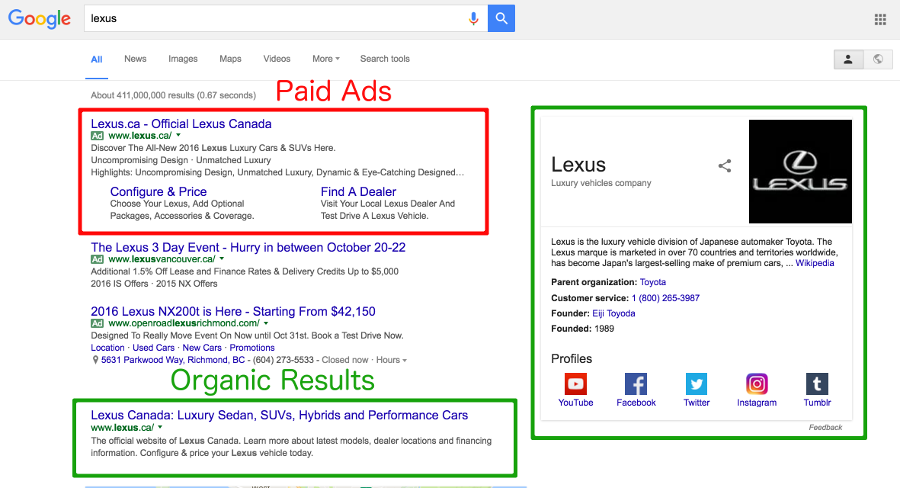
If your business appears in the organic results you may decide you don’t want to bid for your brand terms.
“why waste money paying for clicks?”
Before you make that decision, there are some important things to consider.
1. Generally Brand terms have a better click through rate.
2. They probably rank higher and you'll pay less for your own brand name.
3. By bidding you can control the messaging you want customers to see.
4. You can choose the landing page instead of relying on the search engine.
5. You can use site links to navigate customers to the most valuable pages of the site.
6. You can show off seller ratings and highlight good reviews.
7. Brand targeted ads are also a great place to test your messaging for other channels.
If you have decided you still don’t want to pay for clicks on your brand terms consider these problems.
- "your competition can still bid whilst potentially paying less to do so"
and
- “It might cost you more if you don’t bid on your brand terms”
Consider this scenario. If you stop bidding on your brand terms your ads wont appear for search queries that exactly match those brand keywords.

For example, If the advertiser stops bidding on “hudson bay” and the user searches for Hudson Bay no ad appears.
But if you stop bidding on your brand term, you could still appear along side a “phrase” match keyword. If the user searches for a query that you're bidding on with “phrase” match and their query includes your brand term, your ad will appear. Because you stopped bidding on the brand term, you're paying for the generic keyword. This will normally be more expensive than the brand term.
Other search queries could match brand term depending on the match type.
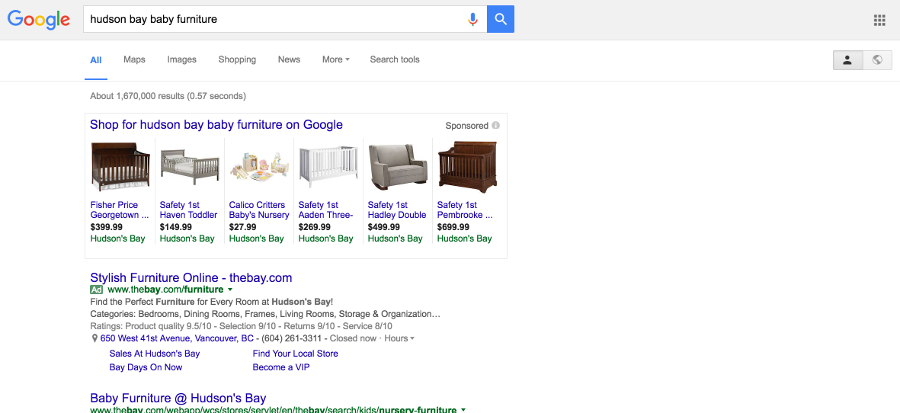
For example, if an advertiser stopped bidding on ''hudson bay' but was “phrase” matching "baby furniture" a user searching for 'hudson bay baby furniture' will trigger your ad. But they will pay for the more expensive "baby furniture" and not "hudson bay".
If you don’t want your ad to appear for search queries that contains a brand term, you'll need to add your brand term to the negative keyword list. If you don’t you could still be bidding.
- But this causes another big problem!
If you add your brand term as a negative you'll exclude your ad from all auctions that include your brand term.
1. There will be a reduction in your ad impressions
2. Your Search Query Reports won’t show how may impressions you missed out on for that brand term
3. You wont see how much of the impression share your competitors have taken
4. Competitors bidding on your brand terms will be able to take the top three ad slots.
You wont even see it happen.
If you’re not worried about loosing ad space to your competitors and you dominate the organic search result you may have stopped bidding on your brand terms already.
But I urge you to wait.
Do you dominate the mobile search results as much as you dominate the desktop results? Mobile search is very different. On mobile if the top slots are taken by ads a customer may never even see your organic listing.
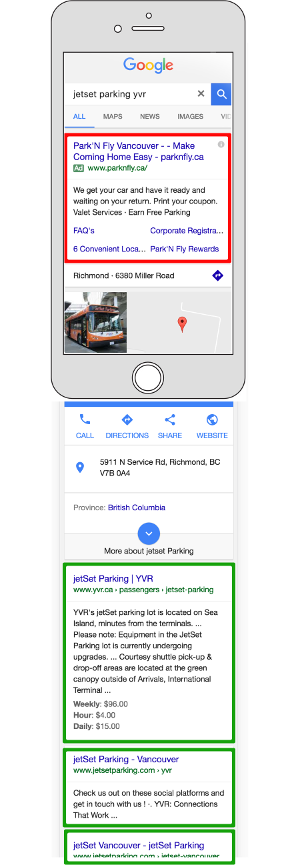
On mobile this advertiser is still at the top of the organic search results. They can’t be seen though because the ad slots have taken up the top of the page.
Where the clicks go if you stop bidding. Based on a Google research study in 2011 89% of the clicks on a paid search ad are incremental (e.g. on top of what they would have got from organic). This means that an advertiser could lose a huge number of clicks that would have come from paid search ads if they don’t bid.
Lets say 200 customers searched for ‘Lexus’. 100 clicked on the organic search results and the other 100 clicked on the paid search ad. If they paused that ad 111 would click on the organic search results. The other 89 potential customers could be lost to competitor sites.
Hypothesis
- “I can increase my profit margin by bidding on my brand terms.”
Setup & Configuration
Its very important you segment and analyse your keyword data. The value of paid traffic compared to organic traffic will vary a lot.
1. Search queries containing an advertiser’s brand name will normally have a higher click through-rate and higher conversion rate.
2. Some keywords tend to be earlier and some later in the conversion funnel.
3. Some users may use different keywords on different devices.
Performance Metric
Once the data has been segmented you can compare it using conversion rates (%) and the average cost per acquisition( $).
- conversions ÷ clicks=conversion rate
Total conversions can be influenced by budget but conversion rate gives you a percentage relative to spend.
- Cost per acquisition should be your go to metric.
With optimisation you can increase your click-through rate (CTR) and drop your cost-per-click (CPC) but you still might not sell anything. If you spend $1000 on paid search and sell 10 products your Cost per Acquisition is $100. If you use CPA as your performance metric you'll be optimising your campaigns to drive sales.
- campaign costs ÷ conversions=CPA
Start using CPA as a metric so you can identify the sources of traffic that really generate revenue.
Campaign Tracking
You must enable campaign tracking.
I have written a detailed blog on campaign tracking here.
Brand Terms Tool
The Brand Terms tool identifies clicks on paid search ads and segments the keywords into a branded and generic groups.
1. Open the Channel Settings and create new channels for your brand and generic keywords.
2. Review the suggested brand terms and add any terms that have been missed by the algorithm.
3. Setup the Channels when prompted
The “Paid Search” Channel is now split. “Branded Paid Search” and “Generic Paid Search”.
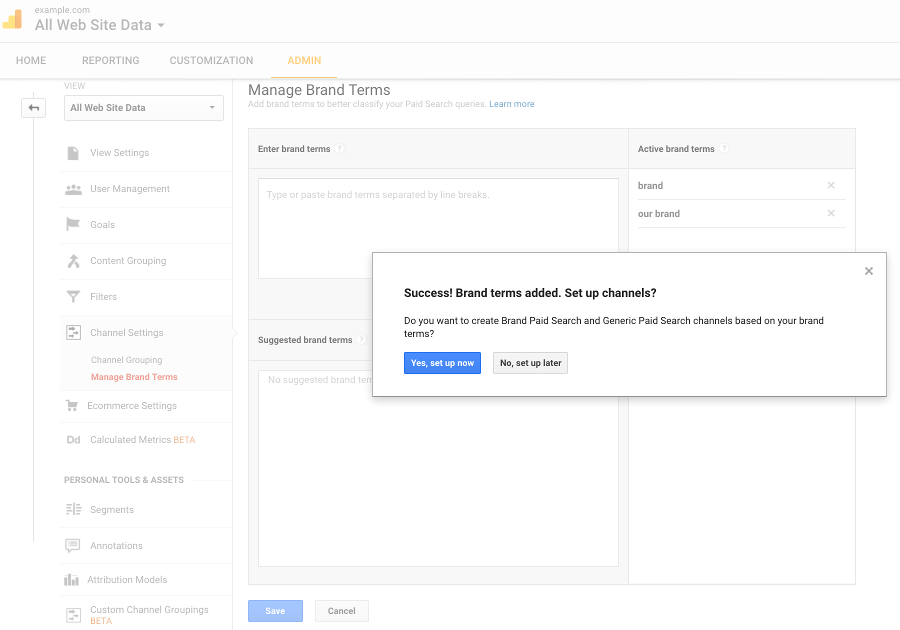
Conversion Segments
Create a conversion segment to include and another to exclude any search queries that include the brand.
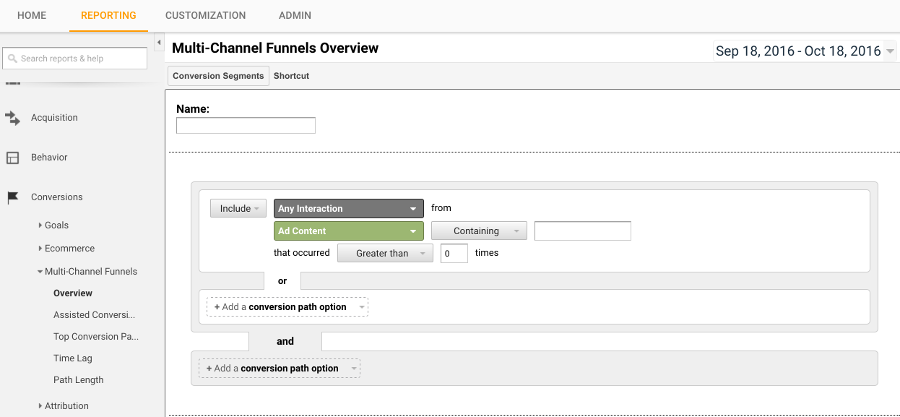
Analysis
Keywords Value
Some keywords are worth more than others. To bid or not to bid, may come down to the profit a keyword makes. Since Google encrypted search queries the value of a keyword have been difficult to work out. We have to make a lot of assumptions because theres a lot of variables.
1. Open Acquisition
2. Open Search Engine Optimisation
3. Open the Queries report
Identify the brand terms your visitors use, the number of impressions, clicks and click-through rate.
1. Open the Paid Keywords report
2. Set the metric group to Ecommerce or Goal Set.
You should be able to identify the Average Order Value, Conversion Rate and Per Session value of your paid keyword easily.
1. Open the Organic Keywords report and do the same.
You should be able to get the same data but all the keywords from google / organic will have been recorded as (not provided). I try to work out what percentage of the (not provided) are brand terms and then scale the values.
1. Open the Organic Keyword report
2. Exclude the (not provided) data
Now you can work out what volume of your organic traffic includes branded terms.
Another way to work out the value of your keywords is to search for your brand terms in Google and see what landing page it returns.
1. Search for your keywords in Google
2. Open the Landing page report
3. Apply segments to only include organic search data
4. Flip the performance metrics over to ecommerce or Goal Set
5. Now you can see the performance metrics by page apply a segment to only include search data and then identify which keywords land where.
6. Get the number of clicks to the website for your brand term from the Search Engine Optimsation Report.
7. Multiply the number of clicks by the conversion rate of the landing page for that keyword.
This will give you the estimated number of users that converted from that keyword in Google Search.
For e-commerce, multiply the estimated number of conversions by the average order value for the landing page of that keyword.
These two values give you your estimated revenue for the keyword. They also give you the data you need to work out average order value, ecommerce conversion rate and the per session value of a keyword.
This method isn't perfect. If your web pages rank for different keywords there can be a big difference between conversion rates for each keyword. The home page for example probably has a higher conversion rate for brand terms than non-brand terms.
Who’s Bidding?
You can run manual searches on your brand terms to see who appears but don’t forget to check mobile as well. If any other ads appear and they have your brand name in the ad copy i’m confident they are bidding on your brand name. If the ads have more generic ad copy they could be bidding on your brand name or they could be broad matching.
Unfortunately regular manual searches aren’t reliable. An advertiser might be targeting another demographic or geographic location. You can use the the google.com/AdPreview tool. It’s free and allows you to see the ads that appear in different locations.
You should run an Auction Insights report. You can see the impression share of competitors for specific keywords. You can see what share of the searches they ranked above your ad for in Google. It will also show you the overlap rate between you and your competitors for specific keywords. Using the Auction insight report you can see which sites are bidding on your terms. Even if an advertisers isn't bidding on your brand terms they may be appearing in the same auction as you.
Organic Results
Its important you understand where you appear in the organic results for brand. Advertisers normally rank first for their brand terms in the organic search results, but you could be lower down the page which is less clickable. A paid ad could help drive more clicks if this is the case.
Unlike AdWords, there isn’t an easy way to track the position of your organic results. There are loads of paid tools on the market but if you don't want to pay use the Search Engine Optimization report. The report shows you what search queries have returned results from your site and it gives you an idea of organic rankings and performance on the Google Search Results page.
Using the “average position” metric you can work out how your site ranks for certain search queries. Google Analytics records the position of each impression and returns the average position.
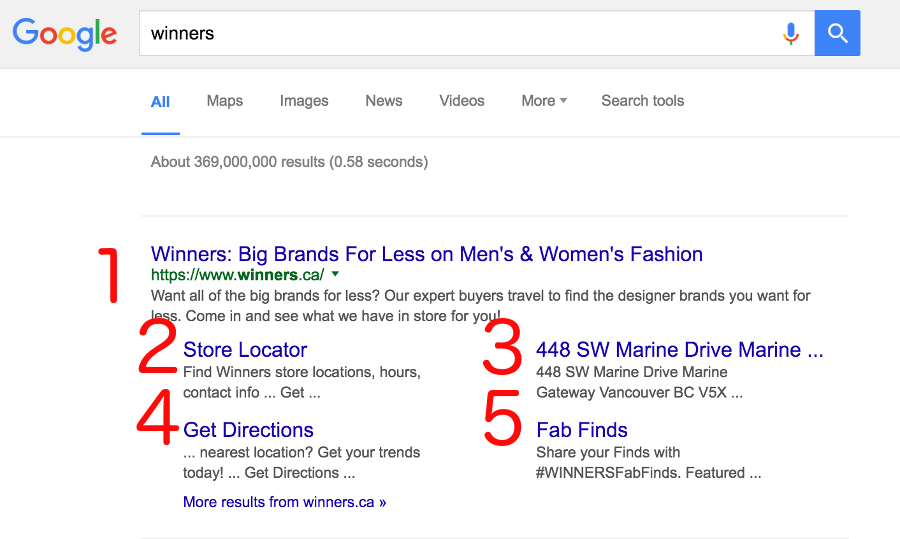
Cannibalizing Organic
You should use the Paid & Organic report in AdWords to compare your organic listings to your paid listings. Compare how many times your website appeared in the;
- Paid search result
- Organic search result
- Both at the same time
1. Are your organic and paid results regularly served in a high position for identical brand terms?
- Check each brand term for high ad impressions but low organic impressions
- Check each brand term for low ad impressions and high organic results
2. What impact do paid ads have on organic result when served together?
3. Does the Average Position have an impact on the CTR?
4. If you pause your paid ads what percentage do you loose and what percentage click on the organic search results.
5. What percentage of customers click on an organic result if there is a brand ad along side?
TIP: Regularly test your paid ads with different messages.
- Tailoring the ad text to the keyword and landing page.
- Test the ad extensions.
TIP: Use the Search Engine Optimization report to identify relevant queries for your business that have low organic traffic.
- Try to target these queries to improve your paid Search presence.
Attribution Model
By default Google Analytics uses a last non-direct attribution model which ignores direct traffic and attributes conversions to the last channel (or keyword) that the customer clicked through.
1. Use the ‘First Interaction Analysis’ & ‘Assisting Interactions Analysis’ to understand which keywords make the conversion path.
2. Use the Generic and Brand channels you created.
3. You should see the Generic keywords have an ‘assisted/last interaction’ value of 0.25. Much lower than that of Branded keywords 0.58. This suggests that Generic keyword are closing your conversions.
If the Assisted / Last Click or Direct Conversions value is close to zero the channel tends to close the conversion. Values close to one equally assist and close the conversion. If the value exceeds one the channel assists conversions.
Use the Conversion Segments to isolate specific conversion paths.

To Bid Or Not
Q: If the users search query is an exact match for your [brand keyword]
Q: There is no competition in the ad slots
Q: Your brand dominates the first page of the organic search results
Q: And you have minimal budget
A: I would not bid
I would still bid on +modified +broad match and “phrase” match keywords. You want to make sure you're appearing for the long-tail phrases you never considered but that a competitor has.
If competitors are trying to steal the top ad spot I would bid. Even if your brand dominates the organic search results, those three top competitors take up a lot of space on the screen. Especially on mobile.
If you don’t think you have any competition make sure you run a competitive analysis report. They may have excluded your location.
If your brand doesn’t control the real estate on the first page of the search results I would be bidding for those keywords.
If no one else is bidding on your brand terms, there is less need for you to bid. But there are still benefits. What value do the extensions bring?
1.Call extensions
2. Location extensions
3. Reviews and stars
4. Site links
5. Control your brand messaging
Round Up
If you need any help setting up your paid search account, give us a call or email us. We're always happy to help out where we can. As well as providing Google AdWords Consultancy we also off Google AdWords Training and in house custom workshops.
Authored by Michael King

Tags:
Share:
If you found this helpfull, share it.
Related Blogs

Your online profile is your resume. Prospective clients will carefully review social media, blogs, industry reviews and peers reviews before contacting you. Old clients will b..

Take 15 minutes out of your day to tag all your digital marketing campaigns and ask your paid search agency to ensure Auto-Tagging is working...

I hate cold calling, and I hate cold emailing. I even find writing a blog difficult. I find writing with one person in mind makes it so much easier. I write to my perfect cus..